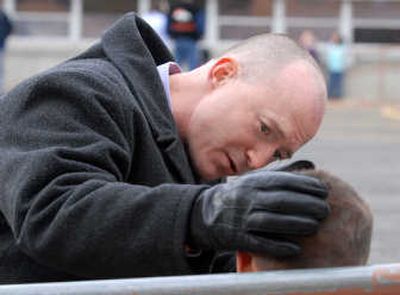Connect: Madison’s pal

There’s something very disarming about Brent Perdue. The 36-year-old principal of Spokane’s Madison Elementary is pretty far from the image that comes to mind when someone says “school principal.” With a stylish light-blue shirt and what appears to be a rather newly shaven head, he looks like your best friend’s big brother dressed up for Thanksgiving dinner.
“The biggest misconception about my position, from the families and kids side, is that the principal is the mean person in the office delivering punishment,” Perdue said. “People think that once you go to the office, bad things happen. (A misconception) from the teacher’s perspective is probably that the job is more like a managerial position, you know, to make sure the bells ring and the building works, so they can focus on teaching.”
Having just returned from a trip to Washington, D.C., to receive two education awards, Perdue is alarmingly awake at 4 in the afternoon, when many of the rest of us are dragging.
“I had never been to D.C. before and I so wish we’d had more time there,” he said, adding that he did get to visit the Museum of the American Indian. Perdue is 1/32 Chickasaw and as such still a tribal member, but his son, being only 1/64 , can’t claim his heritage with the tribe.
“Being a member of the tribe is not something I’ve ever really used for anything,” he said, “but it’s odd to look at my son and think that he’s no longer part of that.”
Born in Clear Lake, Perdue grew up in Cheney and Spokane, near Manito Park. His parents divorced when he was young, and he remembers taking the bus from downtown to meet his dad in Cheney.
“I was probably in third grade, and that’s certainly not something I’d recommend parents do today,” he said. “But it made an impression on me being on that bus full of students.”
His dad, William Dan Perdue, was a sociology professor at Eastern Washington University, and his mom, Melanie Bell, worked in the registrar’s office.
Perdue went to Salnave Elementary in Cheney and graduated from Cheney High School.
“I liked to entertain my classmates, so I ended up spending a lot of time in the principal’s office,” he said sheepishly. “Today, I want the kids to be excited to see me. I go in the classrooms every day and I want the kids to realize that I’m there to help them learn.”
Perdue’s wife, Kim, is a part-time teacher. Together they have Brendan, who’s 7, and 2-year-old Myah, whom they adopted from China.
Like so many other parents who adopt children from China, the process was a bit unpredictable.
“I am a planner,” Perdue said, shrugging. Even the best-laid adoption plans didn’t hold up.
“We ended up having to travel in September,” he said. “I was new here and I was so worried about being gone for three weeks and then taking another week off when we got back. But the district was amazing to me. It all worked out.”
Prior to taking the principal job at Madison, Perdue was an assistant principal at Holmes Elementary. He’s taught at Shiloh Hills Elementary and in the Mead School District as a mathematics teacher.
There are currently about 320 students at Madison, and Perdue knows them all by name.
“I try to get to know them as people. I really try to get to know what’s going on in their families and in their lives,” he said. The school has 51 staff members, including 12 classroom teachers and staff dedicated to a special-needs preschool.
When asked what has made Madison so successful, Perdue doesn’t point the finger at himself. “Our parents really show up,” he said. “Of course, we reach out to them as well, to make sure they show up. And our teachers work incredibly hard.”
What has paid off when it comes to student learning?
“If I have to point to one thing it would be that learning here is voracious,” Perdue said. “And it’s not just the students I’m talking about. The teachers are voracious learners, too. We bring in national experts and do a lot of professional learning here at the school.”
That may be one approach that – though it’s not unique to Madison – really pays off:
“Research shows that when teachers continue to learn, so do the students. Those two things are very closely connected.”